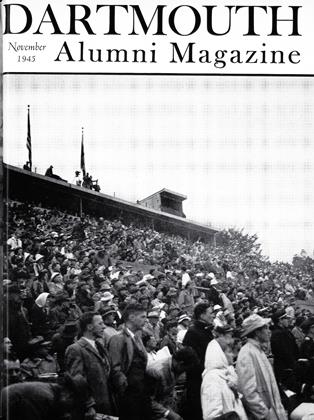SERGEANT GEORGE SHIMIZU '43 wrotethe following letter from Davao, Mindanao,on September 16, 1945. It accompatiied a silkJapanese "good luck" flag.
Just thought I'd drop in for awhile and describe the enclosed souvenir. You've no doubt received dozens of them by now but I guess an extra one won't do any harm. I've been feeling better than ever and now that V-DAY is here all of us in the SWPA are sweating it out. With 21 months overseas I'm just praying we will be back home before too many months pass by. And amid all the celebrating back Stateside at the time of Japan's surrender, we out here couldn't help but feel that the war really wouldn't be over until we passed beneath that Golden Gate again.
The Japanese flag was picked up on the outskirts of Calinan, about ten miles north of Davao City. It isn't a battle flag, but one which was presented by friends to a soldier upon his departure from Japan for the front lines. On it is written, "May God Bless You With Good Fortune" and then it has the various signatures of his friends, written with a Japanese "fude," or writing brush. This soldier was a sergeant in the Heavy Weapons Company of the Katagiri Independent Infantry Battalion, which was under the 100th Division (Lt. Gen. Jiro Harada) and 76th Brigade (Maj. Gen. Isao Tochigi). Col. Hiroichi Katagiri, the battalion commander, is now here in our stockade with his staff officers.
With the war over, hundreds of Japanese soldiers and civilians are streaming down daily from the mountains just to the north of us; it's quite a problem trying to keep everything under control, too. And very much unlike Biak or Leyte, where they were in pathetic condition when brought in, the troops coming in now are practically all well equipped and in good physical shape. Even so they seem happy to get out of the hills.
What surprises me greatly is the calm and matter-of-fact attitude they have concerning Japan's decision to surrender. Most of them say hesitatingly that it was "Our Emperor's orders that made us lay down our arms." However, the honest ones admit that they "didn't have a chance anyway." None want to commit suicide now and most amazing of all is their great desire to return to their homeland as soon as possible. It certainly is a change of policy on their part and it is interesting to talk to them on that score; they're all so keen about seeing their families, wives and children again.
One amusing incident happened just after a group of prisoners was driven into the stockade area. One of them walked over to an MP, extended his hand and said, "Nice war, fellas! You boys deserved to win!" Another one, who came in a couple of days ago, jumped off a truck and bluntly inquired, "Where the hell is all this good chow I've been hearing so much about?" But, as a rule, most of them are pretty cool, especially the Navy men, speaking only when spoken to. And same as in every other campaign they are all exceedingly grateful for the kind treatment and medical care rendered them. They are constantly telling me how thankful they are.
Since my last letter to you from Leyte, we convoyed down here on LSTs and invaded Mindanao last April. (It's all history now.) We were in the Cotabato area for three months, and then four weeks ago we came here on LCIs. At that time we were scheduled to be here for only a week, after which we were to head for Leyte to stage for another invasion; we all thought it China but now we hear it was to have been Japan. Well to make a long story short, Japan asked for peace, our orders were changed and now we're stuck here until we either head for Japan or the States.
 View Full Issue
View Full Issue
More From This Issue
-
 Article
ArticleVISUAL AIDS TO LEARNING
November 1945 By C. N. ALLEN '24, -
 Class Notes
Class Notes1929
November 1945 By F. WILLIAM ANDRES, T. TRUXTUN BRITTAN JR. -
 Article
ArticleLaureled Sons of Dartmouth
November 1945 By H. F. W. -
 Class Notes
Class Notes1918
November 1945 By ERNEST H. EARLEY, DONALD L. BARR -
 Class Notes
Class Notes1945
November 1945 By ARTHUR NICHOLS -
 Article
ArticleThe Undergraduate Chair
November 1945







